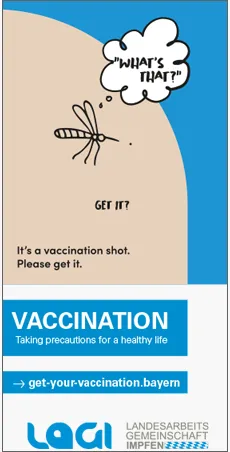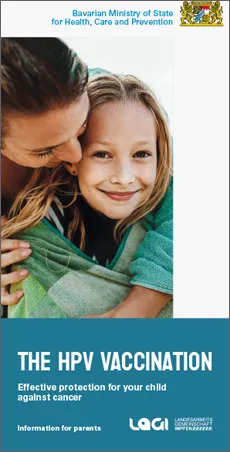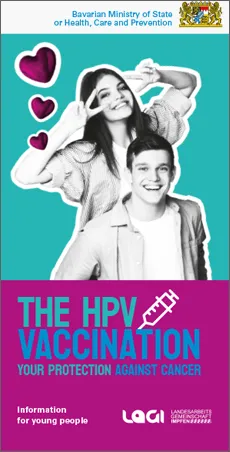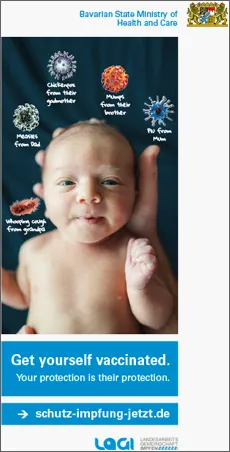Get your Vaccination: Protect yourself and your Community
Vaccinations can save lives. They are one of the most effective preventive measures to protect against severe infectious diseases.
Why should I get vaccinated?
Vaccinations protect against infectious diseases that may be fatal or lead to severe complications, which may include meningitis, damage to the heart muscle, paralysis, or cancer.
However, vaccination not only protects yourself, but often also your community. Timely vaccination does not end at protecting you against serious infectious diseases. Once vaccinated, you are less likely to infect others with a disease as well. It is important for this to be fully vaccinated in time to protect not only yourself, but also those who cannot be vaccinated such as babies or people with weakened immune systems.
Diseases can be eradicated if many people are vaccinated. The eradication of smallpox in 1980 due to consistent vaccination programmes is among the most notable and profound public health successes in history.
Natural immunity VS vaccines – choose the safer option, Source: European Vaccination Information Portal
Who will bear the costs?
The standard vaccinations recommended by the Standing Committee on Vaccination (Ständige Impfkommission; STIKO) are usually covered by your health insurance. Anything beyond the recommended standard vaccinations will differ from health insurance to health insurance. For example, HPV vaccinations will be fully or partly reimbursed by some health insurance companies even beyond the age of 18, and some vaccinations required for travelling may be covered. It makes sense to ask your health insurance company about them!
Special vaccination recommendations
Some vaccinations are specifically recommended for particular groups of people, such as people who work in medical or childcare professions, in professions with lots of crowd contact, or abroad.
STIKO recommends further vaccinations:
- for women before and during pregnancy (find more information in our leaflet „Get yourself vaccinated„)
- for people with chronic illnesses, and
- when travelling to particular countries.
Also contact your doctor about this!
Profession, internship, and travels
Some professions are at an increased risk of coming into contact with particular pathogens. Therefore, it is a good idea for you to protect yourself with the recommended vaccinations before taking up work in such an area. This applies to internships as well. Your employer will be obligated to offer you the vaccinations recommended for your professional activity.
Some vaccinations are also recommended for travelling to particular countries. Some countries even require proof of particular vaccinations upon entry (for example, vaccination against yellow fever). Your individual vaccination recommendation may vary depending on your current vaccination status, the country you are travelling to, the type and duration of your trip, season, planned activities, and any pre-existing underlying conditions. Therefore, you should schedule an appointment for a travel vaccination consultation such as with a specialised doctor, well in advance of your trip.
Booster vaccinations
A single dose of the vaccine isn’t enough in most cases.
Several doses at short intervals are recommended for basic immunisation. Some vaccinations also need to be repeated periodically to maintain your protection (booster vaccination). Recommended booster vaccinations for (young) adults include vaccinations against tetanus, diphtheria, whooping cough (pertussis), polio and, depending on the regional risk, vaccination against tick-borne encephalitis (TBE), as is the case in Bavaria.
Optimal protection requires being vaccinated at the recommended times. However, you should catch up on any missed vaccinations as soon as possible. Even if you did not receive a vaccination in childhood as recommended, it is important to catch up on some of them as an adult. These include, among other things, measles, tetanus, diphtheria, pertussis (whooping cough), and polio.
The vaccination series usually does not have to be restarted; you can catch up later even if you have exceeded recommended intervals between vaccinations.
Generally speaking: Every vaccination counts!
Human papillomavirus (HPV)
Virtually every sexually active person will be infected with human papillomavirus (HPV) once in their life. HPV infections are often harmless. However, some HPV types may cause various types of cancer and genital warts in women and men.
Vaccination against HPV should take place early for reliable protection from the most common high-risk types of HPV. Some vaccines also protect against genital warts. HPV vaccination is recommended for all children aged 9 to 14 – ideally before first sexual contact. It is recommended as a catch up vaccination until the age of 18. Vaccination often still is useful for people over the age of 18.
Learn more about HPV:

Tick-Borne Encephalitis (TBE)
TBE is an inflammatory disease of the brain, meninges, or spinal cord, caused by viruses that are predominantly transmitted by tick bites. Late effects such as persistent headaches or paralysis are possible. Since virtually all of Bavaria is classified as a TBE risk area by the Robert Koch-Institute, TBE vaccination is recommended for the public in Bavaria. Also be sure to ask if TBE vaccination is recommended when travelling.
Three doses within twelve months are required for full protection. Also remember to get your booster vaccinations!
Learn more about TBE:
Measles
Measles is a highly contagious infectious disease that can cause inflammation of the lungs or brain. It can be life-threatening without protection by vaccination. Measles is not only contracted by children, but also by unvaccinated or insufficiently vaccinated (young) adults. Two vaccinations against measles will protect you for life.
Germany supports the WHO’s goal of eliminating measles in Europe. Everyone needs to be vaccinated for this plan to succeed!
Fighting Measles

Learn more about measles:
Will there be any adverse effects?
Modern vaccines are safe and effective: even after a vaccine has been approved, the Paul-Ehrlich-Institute continues to evaluate vaccine safety. Before making a recommendation, the Standing Committee on Vaccination (STIKO) examines the corresponding vaccines based on scientific knowledge from all over the world. Only vaccinations for which the benefits outweigh the small risks by far are recommended.
Short-term reactions may occur after vaccination. These typically disappear entirely within a few days. They may include redness or swelling at the injection site or fever, headache, aching limbs, and feeling unwell. They are caused by the body’s exposure to the vaccine and indicate that the immune system has been mobilised.
It is very rare for a vaccination to affect health in the long term. The benefits of vaccination outweigh the risks by far!
Complications from vaccination
In rare cases, vaccination complications, i.e., consequences that exceed the usual level of vaccination reactions, may occur. These can include allergic reactions or heart muscle inflammations after vaccination with certain COVID-19 vaccines. If a vaccine complication or damage is suspected, health professionals are obliged to report the suspicion to the competent higher federal authority, the Paul-Ehrlich-Institute (PEI). Anyone affected can also report any suspected vaccination complications directly online to the PEI:
Vaccination damage
Permanent vaccine damage is rare. This is defined as “health and economic consequences of damage to health caused by vaccination beyond the usual extent of a vaccination reaction”. These are, therefore, permanent complications that impair the lives of those affected.
There is a right to compensation for officially approved permanent vaccination damage following a publicly recommended vaccination in Bavaria. In Bavaria, applications can be submitted to the Centre for Family and Social Affairs (Zentrum Bayern Familie und Soziales, German website). They will check whether a claim exists.
Myths around vaccination
There is plenty of misinformation about vaccines. This is meant to unsettle and raise doubts regarding the efficacy and safety of vaccines. Therefore, it is particularly important to use only reliable sources and to stay up to date at all times. Exaggerated or polarising news in particular should lead to critical questioning of whether the information is valid. It is best to seek advice from qualified professionals. For example, get advice from your doctor. Pharmacies or your local health department will also answer any questions you may have about vaccination.
Check your sources first before sharing
Learn more about vaccination and trusted sources:

Where can I get vaccinated and answers to my questions
Vaccinations can significantly reduce the risk of many infectious diseases. Have your vaccinations checked to see if they are still complete, even if you can no longer find your vaccination certificate. Make an appointment with your doctor for a vaccination check and consultation. You can also contact pharmacies and your local public health department.
- Finding a doctor through the Association of Statutory Health Insurance Physicians of Bavaria (Kassenärztliche Vereinigung Bayerns): language filter available
- Finding a pharmacy through the Bavarian Chamber of Pharmacists (Bayerische Landesapothekerkammer, German website)
- Pharmacies: Filter by language (choose „Sprache“) and vaccination offer possible (German website, choose „Leistung auswählen“, then „Grippeimpfung“ or „COVID-19-Impfung“)
Learn more

For students
Need support? Your university buddy programme can help. For example:
Vaccination consultation for students at TUM (German Website)





